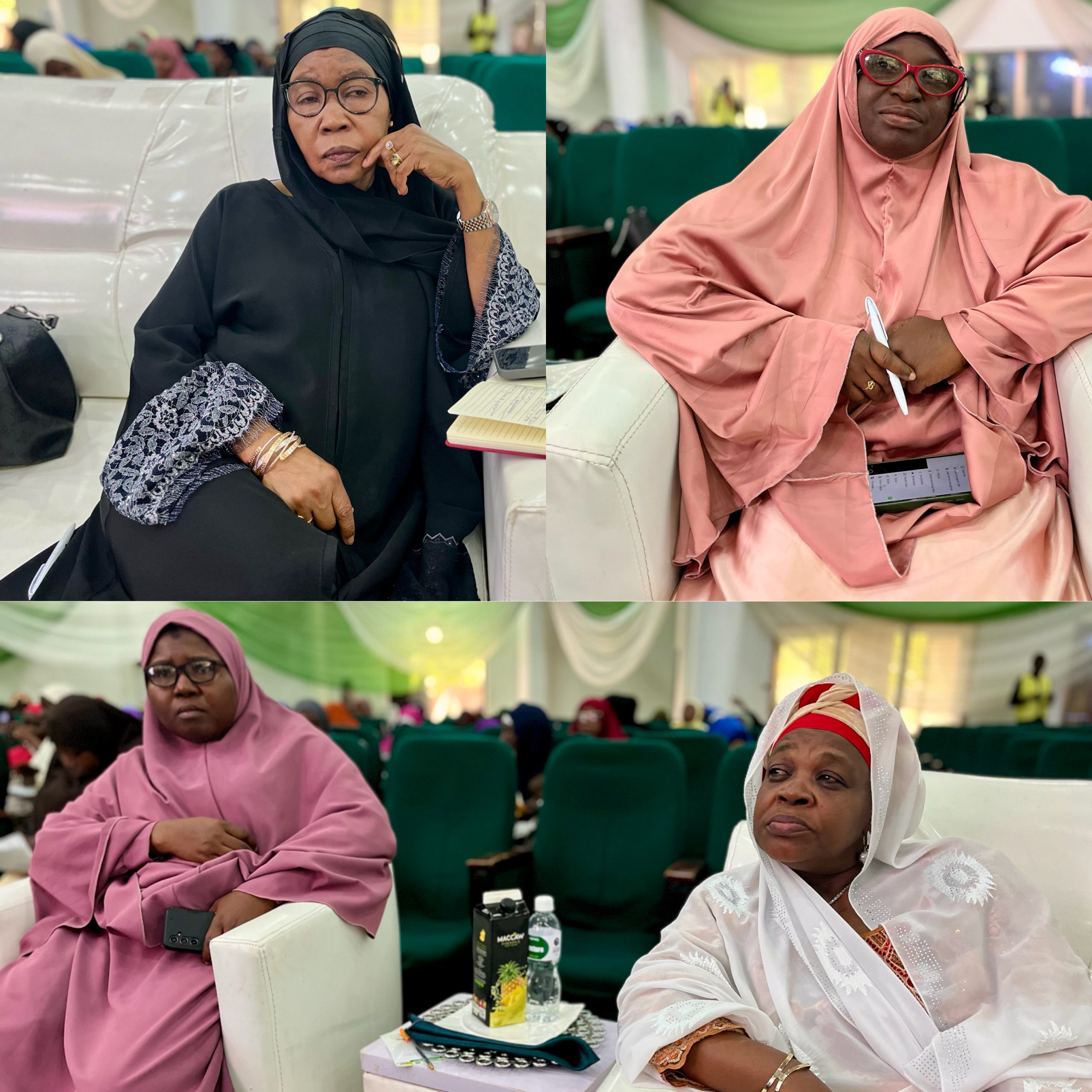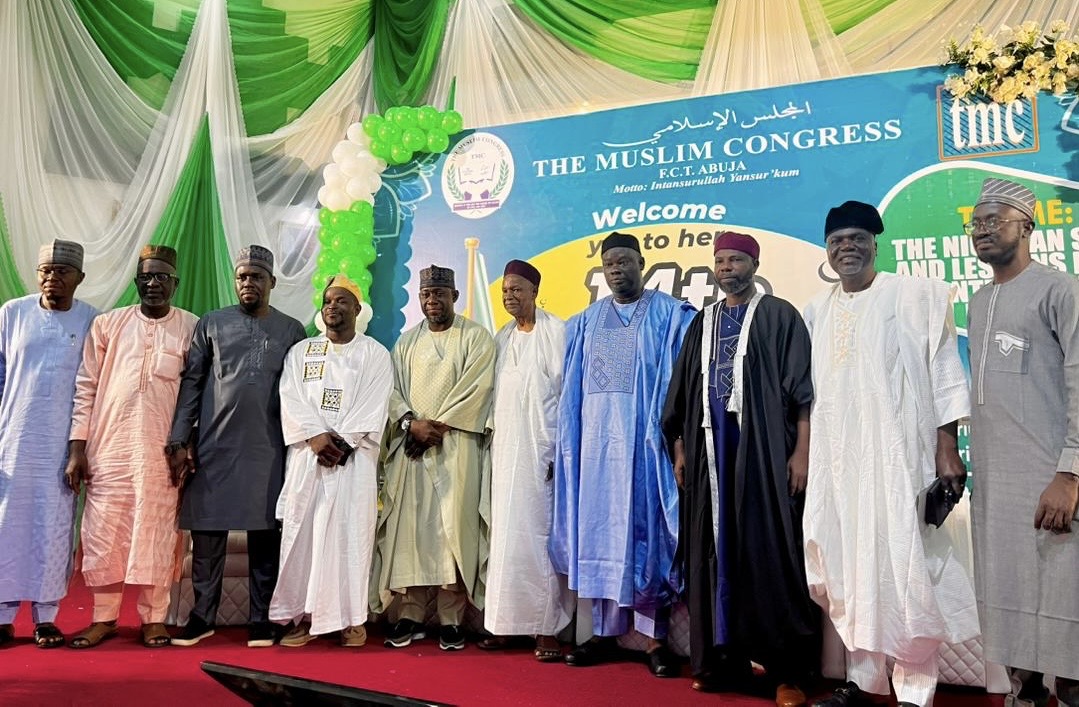Integrity, Youth Development Dominate TMC Independence Lecture
Event to dissect Nigeria’s journey, governance ethics and lessons from contemporary history
By Abdullahi Yusuf
Speakers at the 2025 Annual Independence Lecture of The Muslim Congress (TMC), FCT Chapter, have called on the Federal Government to be more deliberate in designing policies that will address youth development, affordable housing, and national reorientation to restore moral and social values in governance.
The occasion, themed “The Nigerian State and Lessons from Contemporary History,” held on Sunday at the National Mosque Hall, Central Business District, Abuja, drew academics, policymakers, and Islamic scholars from across the country to discuss key national challenges.

The occasion was chaired by Hon. Justice Umar Faruk Abdullahi (CON, rtd), former President of the Court of Appeal, while the Chief Justice of Nigeria (CJN), Hon. Justice Kudirat Motonmori Olatokunbo Kekere-Ekun (GCON), was represented by Justice Uwani Musa Abba-Aji (CFR) of the Supreme Court.
Representing the CJN, Justice Abba-Aji commended TMC for providing an intellectual platform for national reflection and civic enlightenment.
“It is indeed a thought-provoking lecture. We have heard so much about the challenges confronting our nation. These are undeniable facts,” she said.

She urged the organisers to “issue a communiqué to government authorities,” adding that “perhaps something urgent and important will be considered” to address the concerns raised at the event.
Leading discussions on youth development and housing, Prof. Tajudeen Yusuf, President, Institute of Islamic Finance of Nigeria (IIFN), lamented the growing difficulty faced by young Nigerians in securing affordable housing despite various government schemes.

“Most of the federal housing initiatives are interest-based. So, a youth who graduates without a job is already starting life with debt,” he said. “Government must be intentional about developing the youth, not through token gestures, but through sustainable, inclusive policies.”
Prof. Yusuf also decried the mismatch between Nigeria’s educational curriculum and the needs of the job market. He urged collaboration between universities and industries in curriculum design to produce “industry-ready graduates” who can immediately contribute to the economy.
“The industry should be part of the curriculum designers. Any student that is coming should be industry-ready,” he stated.
He further called on government to revisit housing and credit schemes to make them interest-free and youth-friendly, adding: “Why must you steal to build a house? A civil servant’s salary can’t buy a home in Abuja. Government must make housing affordable for honest Nigerians.”

On foreign policy and national values, Dr. Abdul Majeed Dahiru, columnist and political analyst, described Nigeria’s foreign relations as weak and inconsistent due to internal dysfunction and the lack of a cohesive national identity.
“Foreign policy should reflect a nation-first ethos. But Nigeria is still struggling to evolve from a country of tribesmen to a nation of citizens,” he said.
He noted that the dominance of ethnic and religious sentiments in politics has undermined the country’s value system. “Our democracy is driven by ethnicity and religion. The only reward system of identity politics is corruption,” he remarked.
Dahiru added that the Muslim community, despite its large population, must exemplify the Prophet’s most enduring legacy — integrity.

“As Muslims, we have many adherents but fewer practitioners of Islam’s moral values. The Prophet’s greatest legacy was integrity — even his enemies never doubted his honesty,” he said.
Also speaking, Prof. Ibrahim Adepoju Adeyanju, Managing Director/CEO, Calaxy Backbone, Abuja, emphasized the need for Nigeria to develop its own technology ecosystem to reduce over-reliance on foreign ICT solutions.
“Where was China or Singapore 50 years ago? They developed by focusing on technology and education,” he noted. “We should adopt a deliberate policy to empower our youths in innovation and digital skills.”
Prof. Adeyanju advocated for the modernization of Nigeria’s educational system to produce skilled manpower for national development.

“The British brought education and moved on, but we are still doing what they left us. Our curriculum must now serve our national goals,” he added.
He also called for the inclusion of non-interest options in housing and funding schemes, pointing out that “even in non-interest banks, most beneficiaries are non-Muslims,” urging greater inclusivity and awareness among Nigerian Muslims.
In another session on governance and accountability, Prof. Yusuf urged public officials to view leadership as amanah, not an opportunity for personal enrichment.
“Everyone congratulates a new minister as if he’s won a lottery, not knowing it’s a burden of accountability,” he said. “If we understand what accountability means before Allah, no one will be desperate for political office.”
He lamented that many Nigerians see government positions as a means to “grab their share of the national cake,” and called for a reorientation that places integrity and responsibility above material gain.
PEACE Magazine gathered that earlier in the remarks of Engr. Mansur Adewale, Waali of TMC, FCT, he noted the annual lecture serves as a platform for Muslims and Nigerians of all backgrounds to deliberate on national issues and promote unity and accountability.

This year’s deliberations, according to organisers, would be compiled into a communiqué and forwarded to relevant authorities as a framework for governance reforms.
The occasion also featured a presentation of awards to Prof. Tajudeen Yusuf, for contributions to leadership and Islamic scholarship.
Participants at this year’s edition agreed that for Nigeria to truly advance, governance must be anchored on trust, integrity, and deliberate investment in its youth population. As one of the panelists aptly put it, “Nigeria’s rebirth must begin with integrity both in leadership and in the people.”




